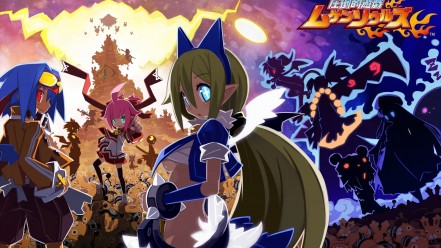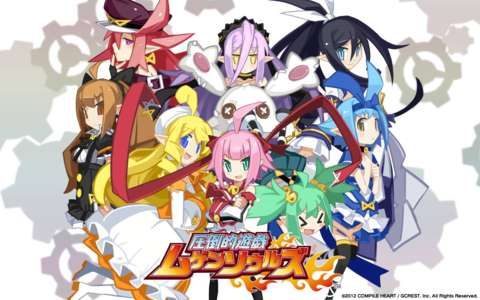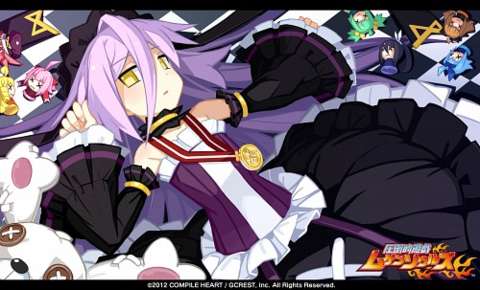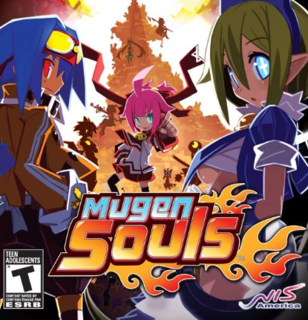
Coming from a person not too familiar with NIS America, I went into Mugen Souls under the impression that it would be a decent RPG experience from start to finish. However, after putting in more than 35 hours into this game, I just feel in love with this game. Everything I wanted in a game was there, but how exactly DID this game win me over? Let's find out...
The story of Mugen Souls starts off with a cutscene where the undisputed god of the universe, Chou Chou, makes her claim to the seven worlds of the universe: Shining Sun World, Glowing Moon World, Vivid Fire World, Frosted Water World, Tropical Tree World, Advanced Metal World, and Earthen Soil World. Her motivation for universal domination is that she saw their seven colors in a dream and thought they were pretty. Having made her decision, she decided to use her power to turn everything in the universe into her underling. Two other characters introduced in the beginning are Ryuto, a pilot who seems useless compared to the rest of the cast but bears a shocking secret, and Altis, an angel who was kicked out of the demon world due to her causing good things to happen during her evil deeds. These three embark on a journey to take control of the entire universe and meet a vast array of characters along their way and uncover a hidden truth about Chou Chou and another character. The story is simple in concept, but is thoroughly entertaining due to hilarious dialogue between the characters, plenty of breaking of the fourth wall, and the plot keeps you interested from start to finish.

Mugen Souls' story only made the experience for me entertaining, however, the combat and absurd number of options presented to the player is what truly encouraged me to buy this game. Gameplay in Mugen Souls is divided into two parts: Regular Battles, and Ship Battles via G Castle. In regular combat, the core combat is turn-based with elements that derive from other NIS title. During each turn, you are allowed to move your character and each character has a certain move and attack radius that limits them on how much they can move. After choosing your position, you are given one of several options, Attack, Skill, Item, Defend, Swtich, and Retreat. Attack has a few suboptions, such as a basic attack to an enemy of your choosing, Link attacks, special moves similar to those of Disgaea, where if you and a party member are in close proximity with each other and you have consecutive terms, you can perform a flashy special move for extra damage. These cutscenes are pretty fun to see, however, I can see this as a nuisance to some, given that you have no option as to what Link attacks activate. Luckily, you are given the option to skip these cutscenes if they start to bother you. The main character, Chou Chou, additionally has a few mechanics unique to her alone. The first of which is the Moe Kill. Given that she has eight different personalities: Ego, Sadist, Masochist, Graceful, Bipolar, Terse, Ditz, and Hyper, she can use them in a minigame where you choose phrases according to the enemy's preference in women and their mood and this can have a few different effects. There are three bars that move to the left of the screen during the Moe Kill which are as follows: the Item Meter (yellow) turns enemies into items; the Frenzy Meter (blue) enrages enemies to the point where they can heal themselves, gain increased stats, and become more aggressive. There is a risk for reward system involved with this system, as deciding what phrases to use is dependent of the enemy's affinity, mood, and your charm level. Second, is the Peon Ball, a special attack composed of shampurus (Chou Chou's peons) that she can drop on enemies to deal massive damage. There is a strategic element in deciding when to use it because if you're not careful, it can overload and kill you and your entire party. The second element of Mugen Souls are the ship battles where you are onboard G Castle and you fight against other ships in what appears as a rock-paper-scissors mechanic, however, it is not that simple. You pick your actions according to phrases that appear throughout the battle that hint at what the enemy is thinking of doing, and you attempt to choose the best course of action. The twist is that some options are better than others to use in certain situations, but none are guaranteed to win, because the enemy ships do change their tactics according to the situation, and if you want to survive, you would be wise to do the same. The battles are pretty exciting and can erase plenty of hours out of your day, but you will be spending most of your time grinding and strengthening your characters' equipment, creating peons, and customizing them. In addition to ship battles, G Castle also operates as your central hub in which you can do a multitude of things to craft an overpowered party. Clothing shops allow you to buy clothing bits to customize your characters in order to make them look silly and offer small stat boost percentages as an extra incentive. Weapon shops allow you to buy and sell weapons using G, and allows you to upgrade them using G Up points and create matter which can offer special effects to the weapons of your choosing. There is also what is called a peon salon, where you trade Mugen Points to create peons that can be used in battle, but are only recommended for use in desperate situations. With peons, you can customize, level them up, and assign jobs (classes) to them. However, you can also do what is called Peon Fusion in which you can fuse two peons together to gain new skills and higher baseline stats. However, the disadvantages are that certain combinations can weaken your character and both characters' levels are reset back to one, and the second character loses all their skills. Next is the hot spring, where you use a combination of shampoo and shampuru to gain stat bonuses that last until you return to G Castle. Finally, the place where you'll be doing most of your grinding is the Mugen Field, where you bet a certain amount of Mugen Points to enter and fight in randomized dungeons up to 100 floors. There are three routes to choose from: Normal Route, basically what you'd expect with the addition of random bosses; Tough Route, where enemies have stronger stats and you can earn more gold and experience here; and Eventful Route, where you'll be fighting mostly slumbering bosses and powerful foes for a chance at better rewards. One final note however is that when you reach certain floors, you gain access to shops that don't show up at G Castle and sell unique gear. As for the endless dungeons, they are simply the continents you visit on each world in which you can fight as much as you please. However, you are not given access to all of the continents upon arrival, so you must raise the continent's peon meter beyond 100% in order to progress further. This game gives you plenty of content to mess around with and rewards you the more time you spend with it (Between you and me, I irritated my family when I'd ignore them just to play this game :P).
Presentation wise, the game is hit or miss with most people. The character designs are pretty fascinating and bring back feelings of nostalgia as I felt that most of them make references to other games and animes that I could not help but laugh at. The music is very upbeat and lighthearted, always suiting the mood for every scenario you are placed in. As an added bonus, if you're lucky, certain copies of the game come with a 20-song soundtrack containing music from the game (Who knew shampurus were such great composers?). However, not everything is as you would love for it to be. First off, the frame rate can get a little hectic while exploring the worlds and fighting battles. It isn't gamebreaking by any means, but is still quite annoying due to how often it occurs. Second, the game is riddled with tutorials, which does a great job with explaining the game's MANY mechanics, most people will find them quite redundant and unnecessary. However, I am not amongst that crowd, so they really did not bother me. My personal nitpick with the game is when I tried to complete the game as low-leveled as possible, but the longer I played, the more I realized that this game tailors to fans of grind-based RPGS. It doesn't necessarily punish players that keep grinding to a miminum, but it goes out of its way to slightly favor players who love micromanaging their party and grinding their hearts away to test their limits. Finally, this game is as anime as it gets. From what I've experienced as an anime fan and gamer, every single trope, meme, and stereotype are placed in a blender and tossed into this game. Is it annoying? No, anything that reminds me of anime is a good thing indeed. However, I ofter raise my eyebrow at the many tropes presented in the game that I've seen countless times before.

With that mouthful of a review about to close, I can safely say that Mugen Souls is not only an outstanding RPG in its own right, but it is a living embodiment of a game that I have longed for my entire life. It has a very lighthearted, yet charming atmosphere, coupled with countless possibilities for customization, addictive gameplay, and one of the only games that leaves me in a good mood long after I stop playing the game. Mere words cannot describe how much I love this game, but it is far from perfect and may not be for everyone. Nonetheless, I am glad I decided to pick this game up as NIS America has mad one more fan out of me and will be looking forward to more games such as Mugen Souls.

